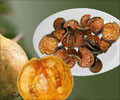Though it is believed that antioxidants like vitamins C and E offer health-promoting benefits by protecting against damaging free radicals, a new study conducted on mice has revealed that an overload of natural antioxidants can actually to heart failure.
Reductants, sometimes referred to as antioxidants, are elements or compounds that easily give up an electron to become "oxidized," while oxidizing agents readily accept electrons. In the body, such oxidation-reduction (redox) reactions are integral to the release and storage of energy. Many cellular pathways are also sensitive to the prevailing redox condition."There is plenty of evidence about the damaging effects of oxidative stress, but there is another side to the coin. There has been so much emphasis on free radicals to the exclusion of the potential consequences of reductants. Our study provides the first bona fide example of the role that reductive stress can play in disease," said Ivor Benjamin of the University of Utah, Salt Lake City.
Oxidative stress, which consumes reducing equivalents, has been often implicated in numerous cardiac and other diseases, Benjamin noted. However, the possibility remained that an inverse imbalance could provoke reductive stress, with the potential for similar deleterious effects. Indeed, reductive stress had been demonstrated in simpler organisms but not in mammals and/or disease states, he said.
In the current study, the researchers examined mice carrying a human mutation earlier linked to so-called protein aggregation skeletal myopathies and cardiomyopathies, in which weakening skeletal and heart muscle contain clumps of proteins. Although the genetic basis for the disease had been linked to mutations in one of two genes, the mechanism responsible remained mysterious.
The researchers now show that mice with one of the mutant genes, aB-crystallin, specifically in the heart develop the same symptoms seen in human patients, including heart enlargement, progressive heart failure, and an early death. They further show that the animals' hearts are under reductive stress.
The find initially took Benjamin by surprise, he said. They had conducted a test traditionally used to measure the level of oxidative stress in the animals, expecting they might see higher than normal levels. Instead, they found the mice had "markedly reduced" oxidative stress levels due to an abundance of a natural antioxidant known as glutathione.
Advertisement
Moreover, they showed that the offspring of the heart-diseased animals and mice with lower levels of one of the antioxidant enzymes, glucose-6-phosphate dehydrogenase (G6PD), were relieved of their symptoms. That finding suggests that drugs or other treatments targeting the antioxidant pathway through G6PD 'might modify the phenotype and the natural history of this inherited disorder in humans'.
Advertisement
"Our findings open up a whole new line of investigation in protein aggregation diseases," Benjamin said.
The study is published in the August 10 issue of the journal Cell.
Source-ANI
LIN/J











